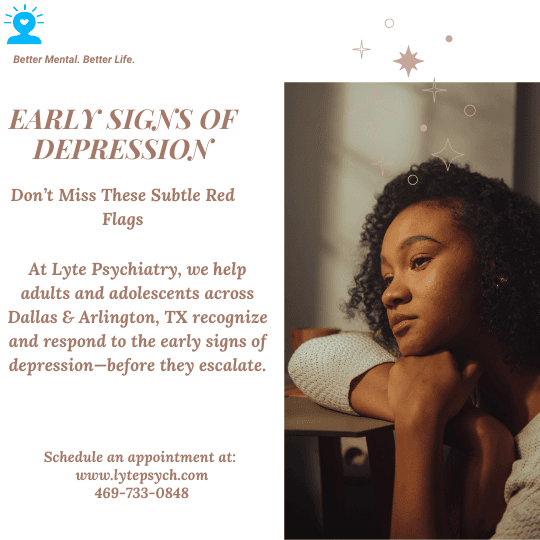Thu May 15 2025
Early Signs of Depression: Don’t Miss These Subtle Red Flags at Lye Psychiatry, Best Psychiatrist and Therapist Near You (Affordable Adults and Adolescents Therapist and Psychiatrist Near You) Dallas & Arlington, TX

Early Signs of Depression: Don’t Miss These Subtle Red Flags at Lyte Psychiatry (Best Psychiatrist and Therapist Near You — Affordable Adults and Adolescents Therapist and Psychiatrist Near You | Dallas & Arlington, TX)
These early signs matter. Catching them early could mean avoiding months (or years) of unnecessary struggle.
6 Subtle Signs of Depression You Shouldn’t Ignore
You don’t need to “hit rock bottom” to be struggling. These small red flags could signal early depression:
1. Constant Fatigue or Low Energy: Even with adequate sleep, you feel physically and mentally drained.
2. Loss of Interest in Activities You Used to Enjoy :Hobbies, social events, or even music/movies you once loved now feel flat or pointless.
3. Irritability or Restlessness: Instead of sadness, some people feel agitated, impatient, or emotionally on edge.
4. Changes in Appetite or Sleep Patterns: Eating too much or too little, sleeping too much or battling insomnia—any sudden change is a signal.
5. Trouble Concentrating or Making Decisions: A foggy mind, memory lapses, or indecisiveness can be signs your mental health is declining.
6. Pulling Away from Friends or Family: Avoiding texts, skipping plans, or “shutting down” emotionally can be early signs of isolation.
Depression Looks Different in Teens
In adolescents, depression often shows up as:
🔷 Sudden changes in school performance
🔷 Withdrawing from friends or family
🔷 Increased sensitivity or defiance
🔷 Risk-taking behavior or frequent outbursts
Teens may not say “I’m sad”—but their behavior often tells a deeper story.
How Lyte Psychiatry Helps with Early Intervention
At Lyte Psychiatry, we specialize in catching mental health concerns early, before they take over your life. Whether it’s a teen struggling in silence or an adult managing invisible weight, we’re here to help.
Our services include:
✅ Comprehensive evaluations for depression in both adults & adolescents
✅ Cognitive Behavioral Therapy (CBT), mindfulness-based therapy, and more
✅ Medication management when needed
✅ Family and teen counseling
✅ Affordable, personalized care options in Dallas & Arlington
✅ Virtual and in-person sessions available
Don’t Wait for Things to Get Worse — Let’s Talk Today & Schedule an Appointment at Lyte Psychiatry (Affordable Therapist and Psychiatrist Near You) Dallas & Arlington, TX
🌱 Small signs matter. Early help makes a difference.
🧠 We’re here to support you, wherever you are in your journey.
👉 Book a confidential consultation with Lyte Psychiatry today. Click Here
📍 To see our services. Click Here
📞 Call us if you have questions at 469-733-0848
Frequently Asked Questions:
Q: What’s the difference between stress and depression?
A: Stress is usually tied to specific events and fades when the situation improves. Depression persists even when things are “going fine,” and affects daily function and mood.
Q: How long do symptoms have to last to be considered depression?
A: If symptoms last more than two weeks and interfere with your quality of life, it's time for an evaluation.
Q: Can kids and teens really have depression?
A: Absolutely. Depression can affect anyone, regardless of age—and early treatment in youth leads to better long-term outcomes.
Q: Do I need to take medication to treat depression?
A: Not always. Many individuals improve with therapy alone. We tailor your treatment to what works best for you.